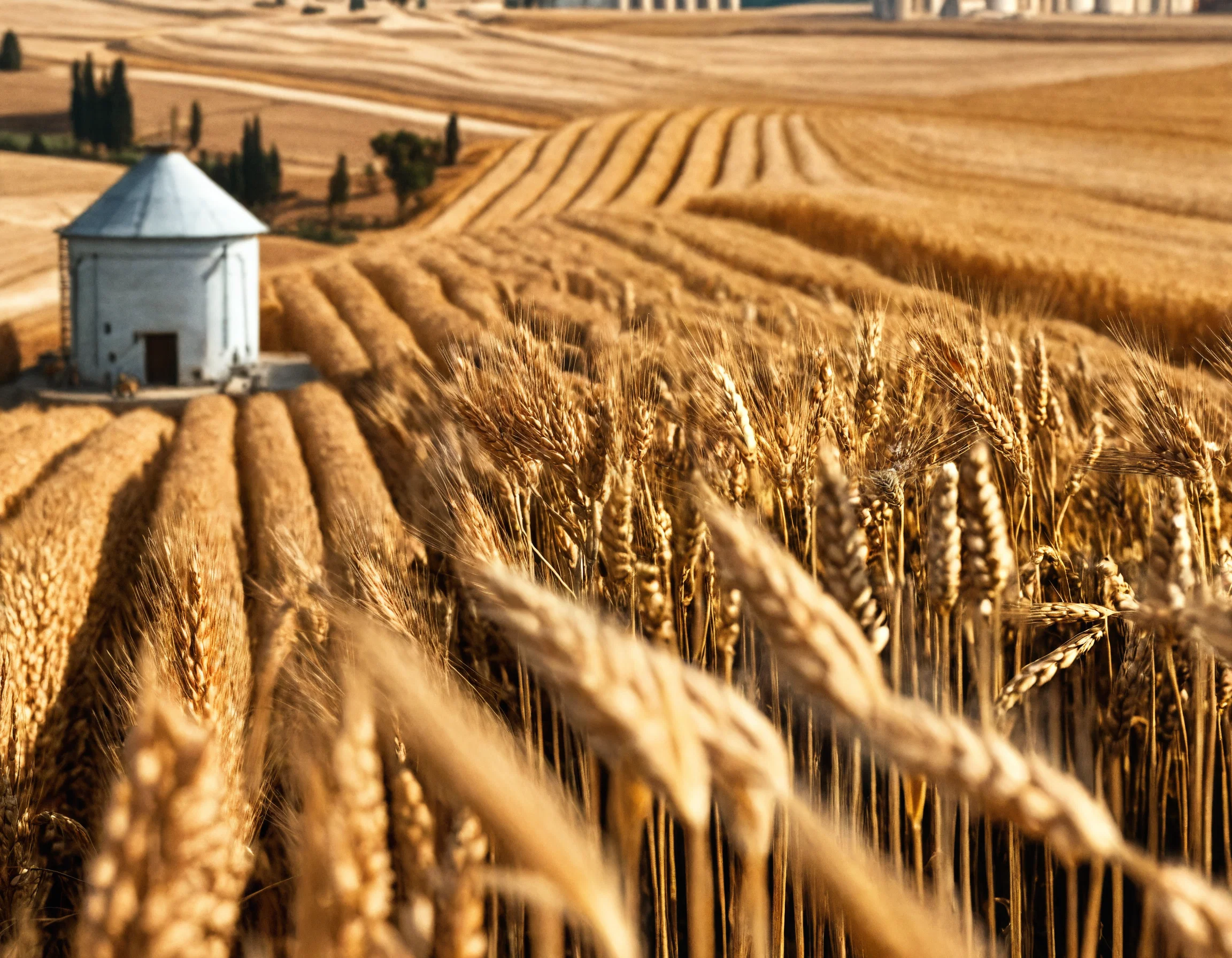Turkey's Flour Production Capacity and Quality
Turkey’s flour industry boasts a rich history and remains a global leader due to its advanced milling technologies and strategic location. Renowned for its high protein content and excellent gluten quality, Turkish flour is favored for various baked goods. It offers a superior balance of protein and elasticity, ideal for both traditional and industrial baking. Cost advantages and favorable trade agreements make it a competitive option without compromising quality. Turkish flour producers’ extensive export capabilities ensure a strong presence in the international market.
Overview of Turkey's Flour Industry
Historical Background of Flour Production in Turkey
Flour production in Turkey has a rich history that dates back to ancient times. Turkey's strategic location and fertile lands made it a crucial hub for wheat cultivation and flour production. Historically, Turkish flour has been a staple in the diet and a critical component of the economy. The Ottoman Empire significantly contributed to the development of milling technologies and techniques that are still influential today.
Current Market Status and Industry Trends
Turkey is currently the leading flour exporter in the world, holding a significant market share globally. The Turkish flour industry is characterized by its advanced milling technologies and high production capacity. Innovations in production and quality control have allowed Turkey to maintain its competitive edge in the international market. Recent trends indicate a growing demand for specialty flours and organic products, reflecting a global shift towards healthier and more diverse dietary preferences.
Major Flour-Producing Regions in Turkey
The major flour-producing regions in Turkey include:
Konya: Known as the "breadbasket" of Turkey, Konya is the largest producer of wheat and flour.
Gaziantep: Home to some of the largest flour mills and a significant exporter of flour.
Tekirdağ: Another key region, especially known for its innovative milling processes and high-quality flour production.
Ankara: The capital region also plays a crucial role in the flour industry with several large-scale mills.
Kirklareli: Known for its substantial contribution to the flour production capacity of Turkey.
Export Markets and International Reach
Turkey exports flour to more than 150 countries, with major markets including the Middle East, Africa, and Southeast Asia. The country's strategic location between Europe and Asia, combined with its advanced logistics and transportation networks, allows Turkish flour producers to efficiently serve international markets. Turkish flour is highly regarded for its quality and competitive pricing, making it a preferred choice for many importers worldwide.
Economic Impact on National and Local Levels
The flour industry significantly impacts Turkey's economy both nationally and locally. Nationally, it contributes to the country's GDP through exports, generating substantial foreign exchange earnings. Locally, the industry provides employment opportunities and supports the livelihoods of farmers, mill workers, and related sectors such as transportation and packaging. The government's support and investment in agricultural technologies and infrastructure have further bolstered the industry's growth and sustainability.
Technologies and Techniques in Flour Production
Advanced Production Technologies Used in Turkey
Turkey’s flour industry has embraced advanced production technologies to enhance efficiency and product quality. Modern flour mills in Turkey utilize state-of-the-art equipment, including high-capacity roller mills, advanced sifters, and automated systems for precise control over the milling process. These technologies ensure a consistent grind, optimal flour texture, and high extraction rates, contributing to superior flour quality. Many Turkish mills also employ computer-controlled systems for monitoring and adjusting various parameters in real-time, leading to significant improvements in productivity and product consistency.
Quality Control Measures and Standards
Quality control is paramount in Turkish flour production, with rigorous measures in place to ensure that the flour meets both domestic and international standards. Turkish flour mills implement comprehensive quality control systems that involve multiple stages of testing, from raw material intake to final product packaging. These tests often include assessments of moisture content, protein levels, ash content, and gluten quality. Advanced analytical tools, such as Near-Infrared (NIR) spectroscopy, are commonly used for accurate and rapid analysis, ensuring that every batch of flour maintains the highest standards of quality and safety.
Innovations in Flour Milling Processes
Innovations in flour milling processes in Turkey are driven by the need for higher efficiency, better quality, and sustainability. Turkish mills have adopted various innovative techniques such as the use of energy-efficient equipment, water-saving technologies, and waste reduction practices. Additionally, there is a growing trend towards incorporating more environmentally friendly processes, such as using renewable energy sources and implementing comprehensive recycling programs within the milling facilities. These innovations not only improve the operational efficiency of the mills but also reduce their environmental footprint.
Techniques for Improving Flour Quality
To enhance the quality of flour, Turkish mills employ several specialized techniques. One such method is tempering, which involves adding a precise amount of water to the grain before milling to achieve the desired moisture content. This process helps in producing flour with consistent texture and quality. Another technique is the use of purifiers and de-stoners, which remove impurities and unwanted materials from the grain, ensuring that only the best quality grain is milled. Additionally, advanced blending techniques are used to create custom flour mixes tailored to specific baking needs, such as high-gluten flour for bread or low-gluten flour for pastries.
Safety Protocols in Production
Safety protocols in Turkish flour production are stringent, aimed at ensuring the safety of both the product and the production process. These protocols include regular maintenance and sanitation of equipment, strict adherence to food safety standards, and continuous monitoring of production environments for potential hazards. Mills often implement Hazard Analysis and Critical Control Points (HACCP) systems to identify and manage risks throughout the production process. Training programs for workers on safety practices and emergency procedures are also a crucial part of maintaining a safe production environment.
Leading Flour Producers in Turkey
Profiles of Top Flour Manufacturing Companies
Turkey is home to several leading flour producers known for their high-quality products and extensive export capabilities. These companies have established strong reputations in both domestic and international markets.
1. Eflani Flour Mills Eflani Flour Mills, a third-generation family business, has been a cornerstone in Turkey’s flour industry for decades. The company prides itself on producing high-quality wheat flour using state-of-the-art technology and rigorous quality control measures. Eflani offers a variety of flour products, including custom blends tailored to specific customer needs. Their export capabilities are impressive, with a global reach that spans several continents. Eflani Flour Mills is dedicated to customer satisfaction, continually receiving positive feedback for their premium products and reliable service.
2. Ulusoy Un Ulusoy Un is one of the largest and most established flour producers in Turkey. Founded in 1989, the company has grown significantly and now operates multiple milling facilities. Ulusoy Un specializes in producing a wide range of flour products, including bread flour, whole wheat flour, and cake flour. They have a strong export presence, shipping their products to over 72 countries worldwide. Ulusoy Un is known for its rigorous quality control measures, ensuring consistent product quality and safety.
3. Tat Bakliyat Tat Bakliyat, founded in 1977, is another prominent flour producer in Turkey. The company offers an extensive variety of flour products, catering to different culinary needs. Their specialties include high-gluten flour for bread and low-gluten flour for pastries. Tat Bakliyat places a strong emphasis on quality assurance, with advanced laboratory testing and state-of-the-art milling technology. They export to numerous countries across Europe, Asia, and Africa, and are recognized for their commitment to customer satisfaction.
4. Doruk Group Doruk Group is a significant player in Turkey’s flour industry, known for its innovative approach and diverse product range. Established in 1973, the company produces various types of flour, including organic and gluten-free options. Doruk Group has a robust export network, supplying high-quality flour to over 60 countries. Their production processes are certified by international quality standards, and they continuously invest in new technologies to enhance product quality and efficiency.
5. Söke Un Founded in 1963, Söke Un has a long history of excellence in flour production. The company produces a wide array of flour types, such as durum wheat flour, rye flour, and specialty flours for different baking applications. Söke Un is committed to sustainable production practices and has implemented comprehensive quality control systems. Their products are exported to numerous countries, and they have a strong reputation for reliability and customer service.
Their Product Offerings and Specialties
These leading companies offer a diverse range of flour products to meet various market demands. Common product offerings include:
Bread Flour: High-gluten content, ideal for baking robust and airy bread.
Whole Wheat Flour: Rich in nutrients, suitable for health-conscious consumers.
Cake Flour: Low-gluten content, perfect for making light and tender cakes.
Specialty Flours: Including organic, gluten-free, and durum wheat flours.
Export Capabilities and Global Reach
Turkish flour producers have established extensive export networks, supplying high-quality flour to numerous countries across Europe, Asia, Africa, and the Americas. Their ability to meet international standards and deliver consistent quality has earned them a solid reputation globally. These companies continually expand their export markets, leveraging their strategic geographic location to facilitate trade.
Quality Control Measures Implemented
Quality control is a critical aspect of flour production in Turkey. Leading companies implement stringent quality assurance protocols, including:
Regular Laboratory Testing: Ensuring flour meets specific quality criteria.
Advanced Milling Technology: Utilizing cutting-edge equipment for precise production.
Compliance with International Standards: Adhering to certifications such as ISO and HACCP.
Customer Satisfaction and Feedback
Customer satisfaction is a top priority for Turkish flour producers. They engage in regular feedback collection to understand and meet customer needs better. Positive reviews highlight the consistency, quality, and reliability of their products. Many customers appreciate the diverse product offerings and the commitment to maintaining high standards.
Quality Assurance and Certifications in Turkey's Flour Industry
Standards and Certifications for Turkish Flour
In Turkey, the flour industry adheres to stringent quality standards to ensure the production of high-quality flour. Key certifications include ISO 9001 for quality management systems and ISO 22000 for food safety management systems. Additionally, HACCP (Hazard Analysis and Critical Control Points) is implemented to systematically identify and manage food safety risks throughout the production process.
Importance of Quality Assurance in Flour Production
Quality assurance is paramount in the flour production industry as it ensures that the final product meets both national and international standards. Consistent quality not only boosts consumer confidence but also enhances the reputation of Turkish flour in the global market. Implementing robust quality assurance protocols helps in maintaining the nutritional value, safety, and overall quality of the flour produced.
How Turkish Flour Meets International Standards
Turkish flour producers employ advanced quality control measures to meet international standards. This includes rigorous testing at various stages of production to ensure the flour’s purity, consistency, and safety. Techniques such as proximate analysis, which measures moisture, ash, protein, and gluten content, are standard practices. Additionally, sensory evaluations and microbial testing are conducted to ensure the flour is free from contaminants.
Overview of Major Quality Standards
ISO 9001: Focuses on maintaining consistent product quality through effective management systems.
ISO 22000: Integrates the principles of HACCP and ensures food safety from farm to fork.
HACCP: Identifies and controls potential hazards in the production process to ensure food safety.
Training Programs for Maintaining Standards
To maintain high-quality standards, continuous training programs are essential. These programs focus on updating the skills and knowledge of employees regarding the latest quality assurance practices and technologies. Regular workshops and seminars are conducted to educate staff on new regulations, advanced quality control techniques, and the importance of maintaining high standards in every aspect of production.
Technology’s Role in Quality Assurance
Advanced technology plays a crucial role in quality assurance in the flour industry. Automated systems for monitoring and controlling the milling process ensure precision and consistency. Technologies such as Near-Infrared (NIR) spectroscopy are used for rapid and non-destructive analysis of flour properties, ensuring real-time quality control. These innovations not only enhance the efficiency of the production process but also ensure that the final product meets the highest quality standards.
Comparative Advantage of Turkish Flour
Unique Characteristics of Turkish Flour
Turkish flour is renowned for its high protein content and excellent gluten quality, which make it ideal for a variety of baked goods, particularly bread and pastries. The unique climatic conditions and fertile soil in Turkey contribute to the high quality of the wheat, resulting in superior flour. Turkish flour also benefits from advanced milling techniques, ensuring consistency and purity in the final product.
Comparison with Flour from Other Countries
Compared to other major flour-producing countries like the United States, Canada, and Germany, Turkish flour stands out due to its unique protein profile and gluten strength. While North American flours are known for their high protein content, Turkish flour offers a balance of protein and elasticity that is particularly well-suited for traditional bread recipes and industrial baking. European flours, on the other hand, often prioritize different characteristics such as ash content and mineral levels, making Turkish flour a preferred choice for specific baking applications.
Case Studies of Successful Importers
Several importers worldwide have benefited from using Turkish flour. For instance, bakeries in the Middle East have successfully integrated Turkish flour into their production processes, noting improvements in the texture and flavor of their bread. In Southeast Asia, pastry manufacturers have reported enhanced dough performance and product consistency. These success stories highlight the adaptability and high quality of Turkish flour in various culinary contexts.
Cost Advantages of Turkish Flour
One of the significant advantages of Turkish flour is its cost-effectiveness. Due to lower production and labor costs in Turkey, as well as favorable trade agreements, Turkish flour is often more competitively priced than its counterparts from Western countries. This price advantage does not come at the expense of quality, making Turkish flour an attractive option for both small-scale and industrial bakers.
Consumer Preferences for Turkish Flour
Consumer preferences for Turkish flour are driven by its superior baking qualities and cost-effectiveness. In regions where traditional bread and pastries are staple foods, Turkish flour is favored for its ability to produce high-quality, flavorful products. Additionally, the consistency and reliability of Turkish flour have earned it a loyal customer base among professional bakers and food manufacturers.
____________________________________________________________________________
Turkey's flour industry stands out globally due to its rich history, advanced milling technologies, and strategic geographical location. The unique characteristics of Turkish flour, such as its high protein content and excellent gluten quality, make it a preferred choice for a variety of baked goods. Compared to flour from other countries, Turkish flour offers a superior balance of protein and elasticity, making it ideal for traditional and industrial baking.
Case studies of successful importers in the Middle East and Southeast Asia demonstrate the adaptability and high quality of Turkish flour, which has enhanced dough performance and product consistency in these regions. The cost advantages of Turkish flour, driven by lower production and labor costs, as well as favorable trade agreements, make it a competitive option without compromising quality.
Consumer preferences for Turkish flour are shaped by its superior baking qualities, consistency, and cost-effectiveness. This has resulted in a loyal customer base among professional bakers and food manufacturers worldwide. The extensive export capabilities and global reach of leading Turkish flour producers further solidify Turkey's position as a major player in the international flour market.
Discover the unmatched quality and cost advantages of Turkish flour with Eflani Flour Mills. As a leading flour producer with a rich heritage and advanced milling techniques, Eflani Flour Mills offers a diverse range of high-quality flour products tailored to meet your baking needs. Whether you are a small-scale baker or a large industrial manufacturer, Eflani Flour Mills has the perfect flour solution for you.


